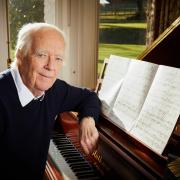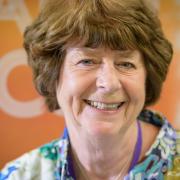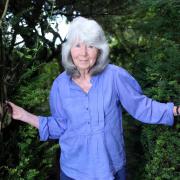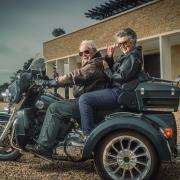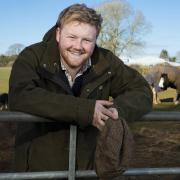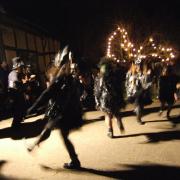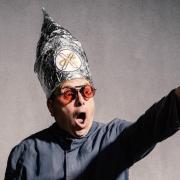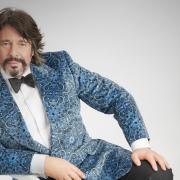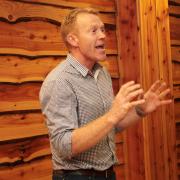Katie Jarvis talks to Gyles Brandreth about the entertaining, enlightening and often hilarious memoir he never should have written.
Gyles Brandreth skips onto stage flippercanoriously (Susie Dent, 2016). I’m too polite, at this early stage in the conversation, to mention his age but – put it this way – you can't imagine him having had more energy at 16. (At least, not without people sustaining significant injury.)
If he didn’t already have the audience in the palm of his hand – which he did – they’re putty within seconds. It’s Cheltenham Literature Festival, and we’re packed into the town hall to hear him speak. ‘I see there are some gaps,’ he notes. ‘These have to be people who have passed away since booking tickets.’


He has connections with Cheltenham. His sisters attended the ladies’ college, complete with mandatory cavernous knickers. ‘For years after they left school, we were using these as dusters.’
If that’s not enough, then – at vastly tender age – he played Hamlet at the Everyman. ‘The critics didn’t like it. The audience came prepared not to like it: they threw eggs at me. I came on as Hamlet and came off as Omelette.’
This is sheer VFM. There’s never fact without anecdote without very funny observation. Take his memories of children’s television:

Watching his parents’ Radio Rentals set (not ITV, obvs; they were middle-class), eating Marmite and tomato sandwiches washed down with chocolate-flavoured Nesquik, he’d devour Billy Bunter of Greyfriars. ‘In Harry Potter, the theme is magic; in Billy Bunter, the theme was obesity. The show ended with him always being beaten.’
It was, he reminisces, a more innocent world. A world where late-middle-aged men would beat the backsides of schoolboys for national entertainment. Such as Whack-O!, featuring Jimmy Edwards as headmaster (who – little nugget here – once stripped off in his kitchen and invited Gyles to join him in his sauna). ‘I loved Whack-O! The entire theme was about whacking children. Go to YouTube – on someone else’s computer – and watch clips.

‘My favourite musical was Gigi, the older man played by Maurice Chevalier: Thank Heaven for Little Girls. Now he would be arrested.’
See what I mean? Entertaining personal fact; enlightening anecdote; hilarious observation; glimpse into (can I say ‘oral’?) history, all beautifully paired with heavyweight changes in criminal law.
What’s more, this man is the non-fiction embodiment of William Boyd’s Any Human Heart. He’s met every Significant Someone it’s humanly possible to meet from 1948 (there you go) onwards.

THEY SAY – indeed, Gyles Brandreth says; (he’s met him. Obviously) – that Bill Clinton has the ability to make you feel you’re the only person in a room.
Gyles Brandreth, I’d propose, has that same irresistible quality. We’re in a (quite) busy writers’ room at the literature festival, fascinating authors drifting by. But Gyles’s lemon drizzle, cup of tea and I feel as if we’re the only important elements here.
I don’t know how the cake is reacting, but I’m smitten.
We’re discussing his recently published, best-selling memoir, Odd Boy Out.
It’s a memoir, in theory, that he never should have written.

His wife, Michèle, counselled against it. ‘Does the world really need another book by you? You’re the person who put ‘me’ into memoir.’ (She appears wonderfully but sparingly throughout as a Greek chorus sighing, ‘Hubris’.)
Even Prince Philip (effectively) counselled against it, as Gyles explains.
‘I had written a biography of the Duke of Edinburgh and, indeed, a version of it came out this year called Philip: The Final Portrait. I admired him hugely.’
The Duke – whom Gyles met during their time together on the National Playing Fields Association charity – had had a pretty ropy childhood to say the least. ‘But his view was that, to be happy, you’ve got to look up and out, not down and in.’
(I adore this oxymoron: ie, My friend, the Prince, advised me to be modest enough not to write an autobiography.)
But two things trumped Gyles’s formidable personal advisers.
Firstly, he and Michèle have three children and seven grandchildren. ‘And we’ve discovered over the years that money is the one thing keeping us in touch with them. I do need to go on earning money.’
Secondly (err, der), lockdown happened, and everything in his diary was cancelled, including a stage show he was due to do with friend Dame Judi Dench.

‘I’ve had a philosophy all my life, which I was introduced to by a schoolteacher when I was about 10. The headmaster of my school – a man called Mr Stocks, who was 82 – said, ‘Brandreth, busy people are happy people. Remember that.’ And I did remember that, from that day to this.’
(Pause for interesting psychology point, if you don’t mind me butting in. I’m fascinated that he has to justify his memoirs. As if you’d need to justify writing a book as good as this. Wonder what this says about him.)
Anyway. The third point (I know I said two but they keep on coming) is that he had all the necessary material handy. ‘I keep everything: every train ticket, every menu. I’ve been keeping a diary since 1959 and I’ve got a room that is the size [gestures expansively] from here to there, full of boxes that are eight foot high. Somewhere on my phone I’ve got a photograph, and you would gasp.’
Viz: Saturday, 15 July 1961. Yesterday, le quatorze juillet, in the dining room on the French table at lunch we had a really gay meal, with, besides our school fish, tomato salad, cheese, fruit and WINE. The wine was Spanish! Vive la France!

THE THING IS THIS. I don’t have room to say all I want to about Odd Boy Out.
It’s full of fascination. Stand in your local bookshop and simply browse the index. At random: Aga Khan; Burgess, Guy; Fellowes, Julian (they once shared a bath); (NB both under six at the time); Muir, Frank; Twiggy; (even Woolf, Leonard, fgs); Wilde, Oscar (their timelines might not be ideal, but the claim to connection is formidably made).
Ad infinitum. (Or, in this case, ad page 423.)

This is a book about Gyles Brandreth’s life. And, yes, it’s a gilded life. If ever you doubted it, you need but glance at the front cover of young Gyles at the Tower of London. Had you or I visited this capital attraction, we’d undoubtedly have left with tacky snow-globe and a christening from an incontinent raven. Gyles’s photo from the 1950s shows a small boy in turquoise wool coat, holding hands with a friendly Beefeater and a Coldstream Guard.
Of course he was going to grow up to be a man who could say things such as ‘Having been there… with Princess Diana, with David Beckham, with the Beatles in their prime…’; my friend Jon Culshaw’; and ‘Jane Asher slept in my bed’ (albeit: ‘Maddeningly, I was elsewhere at the time.’)
But what makes it tantalising is this: alongside his celebrity stories, his delightfully observed domestic portraits bring to life whole lost worlds. Past-foreign-country worlds where, as he and Michèle brought up their children, young mothers in their social circle would take their children to nursery, having already cooked and served their husbands a full English. Men would don black tie for dinner parties where ladies would postprandially withdraw to their hostess’s bedroom.

Meandering back further still, Gyles – aged five – is trotting by himself to the corner shop to buy 20 Craven ‘A’ for his dad. Aged six, he is travelling to school each day on the underground, all by himself.
‘One of my happiest memories is of sitting on my father’s lap, driving down an A-road. I was three or four and he allowed me to steer the car while he was lighting a cigarette, both his hands off the wheel. No seatbelts then.’
His three older sisters were born before the war; he was brought up like an only child. The only thing his dad might have welcomed more than a son was a Mercedes.
‘When I went to the Fulham Baths for my first swimming lesson and found I couldn’t walk on the water, I think I was probably surprised. Because I just assumed that I could do anything.
‘The upside is that it has given me confidence – a feeling I could do anything. Which is probably why I’ve tried doing a lot of different things throughout my life.’
No idle exaggeration, that. We skip through his career: novelist, actor, TV personality, MP, podcaster; more obliquely, founder of the Association of British Scrabble Players and a teddy bear museum…
I’m only stopping because I’ve run out of breath.
I do idly wonder, as I read the list of achievements and opportunities - which almost presented themselves like courtiers to a king – whether he ever longed to struggle. Odd question, I know.
He considers it courteously.
The downside to being a golden child, he concedes, is that it gives you a sense of entitlement:

‘Charlton Heston… When I was a child, he was THE star of his day, in The Ten Commandments, playing Moses. I met him in the 1980s, at TV-am:
‘He is on the sofa. I sit down next to him and put my cup of coffee down. And he immediately picks it up and begins to drink it, assuming it’s for him.
‘That illustrated for me what a sense of entitlement is.’
And so – in book and in conversation - we progress through Gyles’s life, anecdote by famous-person anecdote.
Among my favourites are:
Old-school actors, husband-and-wife team Dulcie Gray and Michael Denison, who performed in Christmas shows Gyles saw as a child. Years later, Dulcie revealed that, on hearing his cancer was terminal, Michael put on his best suit to break the news to her.
There’s an exquisitely uncomfortable chat with the Queen (do buy the book, if only to read this) on vegetarianism. It’s a conversation that gives ‘banal’ a bad name while simultaneously being absolutely mesmerising.
And one about Gyles meeting Sir Laurence Olivier in 1964, by the simple expedient of letting himself into Chichester Festival Theatre’s back-stage after everyone but the star actor had cleared off home. Among the ingots of advice the great man imparted – ac-tor to ac-tor – was, ‘I suggest you come on [stage] backwards’.

DAZZLING INDEX ASIDE, those famous names are not the stars of this marvellous book.
Nope.
The stand-outs are his parents.
As Gyles Brandreth rightly declares, he has had a golden life; a life which has given him a glass-half-full joie de vivre. Yet what becomes clear to us – and to him – as he examines that glass, is that his loving, uncomplaining, generous parents emptied their own to fill his.
As he sifted through the artefacts in that piled-high room full of memorabilia, Gyles came across his dad’s household accounts. Out tumbled invoices for barely-affordable school fees; haircuts in Harrods; foreign holidays. A nightmare mismatch of income and spending. Suddenly, memories of his dad hunched at the kitchen table, endlessly shuffling bills – deciding which he could pay – made awful sense.
Odd Boy Out ends with a letter. ‘Dear Pa, I hope there is a heaven because I would love you to be able to read this.’
‘I loved your book,’ I say to Gyles Brandreth. ‘It made me laugh out loud; but it turned out to be not quite what I was expecting. It turned out to be a book about love. And a book about grief.’
‘Oh, how interesting,’ he says. ‘That’s very interesting.’
And that’s the unifying element of Odd Boy Out.
We might not have Gyles’s celebrity friends. But, exactly like him, what would we not give for five more minutes with our parents, simply to say, ‘Thank you. It really did turn out OK in the end’.


AS WE FINISH CHATTING, I notice – sitting at the far end of our table – the travel-writer Colin Thubron, whose books I have admired for years.
I feel a pang of envy as the journalist with him calls out, ‘Gyles, might I introduce you to Colin?’
I make to fade discreetly away, already a distant journalistic memory. But, as I move off, Gyles turns, stretching out an arm towards me. ‘And may I introduce…’ he begins, warmly.
That’s really all you need to know about Gyles Brandreth.
Odd Boy Out by Gyles Brandreth is published by Michael Joseph, price £20



